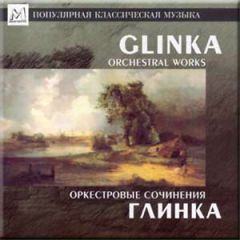Mikhail Glinka - Orchestral Works
Mikhail Glinka - Orchestral Works

1. Symphony On Two Russian Themes (Edition by V. Shebalin) 2. Jota Aragonesa (Spanish Overture No.1) 3. Summer Night in Madrid (Fantasia on Spanish Themes Spanish Overture No.2) 4. Waltz-Fantasia Incidental Music to N. Kukolnik’s Tragedy "Prince Kholmsky" 5. Overture 6. Entr’acte to Act II 7. Entr’acte to Act III 8. Entr’acte to Act IV 9. Entr’acte to Act V 10. Premiere Polka in B flat Major (Instrumentation by M. Balakirev) The USSR Symphony Orchestra Conductor Evgeni SVETLANOV Recorded in 1984 (1,5), 1967 (2-4), 1990 (6)
Mikhail Glinka was born on June 1 (o.s. May 20), 1804 in the village of Novospasskoye in the province of Smolensk. He started to learn to play the piano and the violin at the age of 10, his teacher was Varvara Klammer, a governess invited from Saint Petersburg. In 1817 he is dispatched to a school for the children of the nobility at the Saint Petersburg University. There he makes first attempts at composing when in 1822 he writes variations for harp or piano based on a theme from the Weigl’s opera “Die Schweizer Familie”. After leaving school he engages himself totally in music focusing on composition, he writes songs and romances, setting to music verses of contemporary poets.
Composing becomes Glinka’s priority in life. He constantly strives for perfection. In 1830 he leaves for Italy where he writes music permeated with Italian tradition, studies bel canto, meets famous composers. He forms his style and his works acquire confidence and originality. After three years in Italy Glinka visits Berlin where he studies composition and instrumentation under Siegfried Dehn. When news of his father’s death reaches him in 1834, he immediately leaves for Russia.
In the spring of 1835 Glinka marries Maria Ivanova and moves to Novospasskoye. Glinka had returned home from Europe possessed with the idea of creating a national Russian opera. In the calm of his home he embarks on the project. The effort materialized in the opera “A Life for the Tsar” which premiered on November 27, 1839, at the Saint-Petersburg Bolshoi Theatre and was a staggering success. The following two years Glinka works as choirmaster to the Imperial Chapel. His second opera “Ruslan and Lyudmila” was presented to the public exactly six years after the premier of “Ivan Susanin”. This time it was coolly received. In 1844 Glinka leaves for Paris.
There he befriends Berlioz who in the spring of 1845 conducts some excerpts from Glinka’s operas “Ruslan and Lyudmila” and “Ivan Susanin”. Inspired by the event Glinka resolves to give a charity concert featuring his works and it is staged with a great success at the Herz concert hall. In May Glinka visits Spain where he gets acquainted with the local culture and traditions and collects folk tunes. The trip yielded the Spanish overture No. 1 “Jóta Aragonesa” and the orchestral “A Night in Madrid”. The latter is written after his return to Russia in 1848. He leaves for Warsaw the same year to start working on a new mode of Russian symphonic music.
In 1851 Glinka is back to Saint Petersburg but leaves for Europe only one year later again. While in Paris Glinka starts the “Taras Bulba” symphony, which remains unfinished, and leaves France due to the beginning of the Crimean war. In 1856 the composer is in Berlin again where he studies liturgical choral music.
Mikhail Glinka dies on 15 February, 1857, and is buried in Berlin, but a few months later his remains are taken to Russia and reinterred at the Tikhvin Cemetery in Saint Petersburg. --- musicaneo.com
download: uploaded anonfiles yandex 4shared solidfiles mediafire mega filecloudio
Zmieniony (Czwartek, 28 Listopad 2013 11:30)








